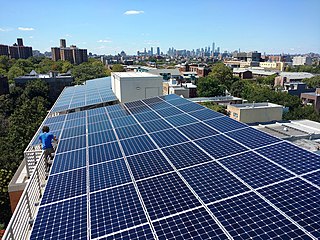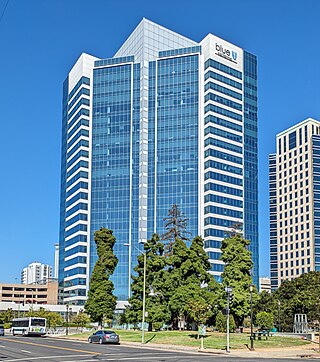Related Research Articles

Sanyo Electric Co., Ltd. is a Japanese electronics manufacturer founded in 1947 by Toshio Iue, the brother-in-law of Kōnosuke Matsushita, the founder of Matsushita Electric Industrial, now known as Panasonic. Iue left Matsushita Electric to start his own business, acquiring some of its equipment to produce bicycle generator lamps. In 1950, the company was established. Sanyo began to diversify in the 1960s, having launched Japan's first spray-type washing machine in 1953. In the 2000s, it was known as one of the 3S along with Sony and Sharp. Sanyo also focused on solar cell and lithium battery businesses. In 1992, it developed the world's first hybrid solar cell, and in 2002, it had a 41% share of the global lithium-ion battery market. In its heyday in 2003, Sanyo had sales of about ¥2.5 trillion. However, it fell into a financial crisis as a result of its huge investment in the semiconductor business. In 2009, Sanyo was acquired by Panasonic, and in 2011, it was fully consolidated into Panasonic and its brand disappeared. The company still exists as a legal entity for the purpose of winding up its affairs.

Duke Energy Corporation is an American electric power and natural gas holding company headquartered in Charlotte, North Carolina. The company ranked as the 141st largest company in the United States in 2024 – its highest-ever placement on the Fortune 500 list.

Rural electrification is the process of bringing electrical power to rural and remote areas. Rural communities are suffering from colossal market failures as the national grids fall short of their demand for electricity. As of 2019, 770 million people live without access to electricity – 10.2% of the global population. Electrification typically begins in cities and towns and gradually extends to rural areas, however, this process often runs into obstacles in developing nations. Expanding the national grid is expensive and countries consistently lack the capital to grow their current infrastructure. Additionally, amortizing capital costs to reduce the unit cost of each hook-up is harder to do in lightly populated areas. If countries are able to overcome these obstacles and reach nationwide electrification, rural communities will be able to reap considerable amounts of economic and social development.

Good Energy Group PLC is a British energy company based in Chippenham, Wiltshire that provides services in the electrification of transport and decentralised renewable energy generation such as domestic solar panels. The company is also an energy retailer, and built a portfolio of wind and solar generation which was sold in 2022. Founded by Juliet Davenport, its CEO is Nigel Pocklington.

Anthony Kapel "Van" Jones is an American political analyst, media personality, lawyer, author, and civil rights advocate. He is a three-time New York Times bestselling author, a CNN host and contributor, and an Emmy Award winner.

According to data from the US Energy Information Administration, renewable energy accounted for 8.4% of total primary energy production and 21% of total utility-scale electricity generation in the United States in 2022.

RechargeIT is one of five initiatives within Google.org, the charitable arm of Google, created with the aim to reduce CO2 emissions, cut oil use, and stabilize the electrical grid by accelerating the adoption of plug-in electric vehicles. Google.org's official RechargeIT blog has not been updated since 2008.

A green-collar worker is a worker who is employed in an environmental sector of the economy. Environmental green-collar workers satisfy the demand for green development. Generally, they implement environmentally conscious design, policy, and technology to improve conservation and sustainability. Formal environmental regulations as well as informal social expectations are pushing many firms to seek professionals with expertise with environmental, energy efficiency, and clean renewable energy issues. They often seek to make their output more sustainable, and thus more favorable to public opinion, governmental regulation, and the Earth's ecology.

First West Yorkshire operates both local and regional bus services in West Yorkshire, England. It is a subsidiary of the FirstGroup, and is made up of three sub-division brands: First Bradford, First Halifax, Calder Valley & Huddersfield and First Leeds.
Green jobs are, according to the United Nations Environment Program, "work in agricultural, manufacturing, research and development (R&D), administrative, and service activities that contribute(s) substantially to preserving or restoring environmental quality. Specifically, but not exclusively, this includes jobs that help to protect ecosystems and biodiversity; reduce energy, materials, and water consumption through high efficiency strategies; de-carbonize the economy; and minimize or altogether avoid generation of all forms of waste and pollution." The environmental sector has the dual benefit of mitigating environmental challenges as well as helping economic growth.

Solar power includes solar farms as well as local distributed generation, mostly on rooftops and increasingly from community solar arrays. In 2023, utility-scale solar power generated 164.5 terawatt-hours (TWh), or 3.9% of electricity in the United States. Total solar generation that year, including estimated small-scale photovoltaic generation, was 238 TWh.

A battery electric vehicle (BEV), pure electric vehicle, only-electric vehicle, fully electric vehicle or all-electric vehicle is a type of electric vehicle (EV) that uses electrical energy exclusively from an on-board battery pack to power one or more electric traction motors, on which the vehicle solely relies for propulsion. This definition excludes hybrid electric vehicles, which use internal combustion engines (ICEs) in adjunct to electric motors for propulsion; and fuel cell electric vehicles (FCEVs) and range-extended electric vehicles (REEVs), which consume fuel through a fuel cell or an ICE-driven generator to produce electricity needed for the electric motors. BEVs have no fuel tanks and replenish their energy storage by plugging into a charging station or electrical grid, and use motor controllers to modulate the output engine power and torque, thus eliminating the needed for clutches, transmissions and sophisticated engine cooling as seen in conventional ICE vehicles. BEVs include – but are not limited to – all battery-driven electric cars, buses, trucks, forklifts, motorcycles and scooters, bicycles, skateboards, railcars, boat and personal watercraft, although in common usage the term usually refers specifically to passenger cars.

The Green Collar Economy: How One Solution Can Fix Our Two Biggest Problems is a 2008 book by Van Jones. It outlines a plan for simultaneously solving socioeconomic inequality and environmental problems. The book has received favorable reviews from Al Gore, Nancy Pelosi, Laurie David, Paul Hawken, Winona LaDuke and Ben Jealous. The Green Collar Economy is the first environmental book written by an African-American to make the New York Times bestseller list.

Phaedra Ellis-Lamkins is an American social justice advocate and businesswoman.
The climate change policy of the United States has major impacts on global climate change and global climate change mitigation. This is because the United States is the second largest emitter of greenhouse gasses in the world after China, and is among the countries with the highest greenhouse gas emissions per person in the world. Cumulatively, the United States has emitted over a trillion metric tons of greenhouse gases, more than any country in the world.

Solar Mosaic is a clean energy fin-tech company based in Oakland, California. Founded in 2010, Mosaic created its initial business model using crowdfunding principals to offer loans for commercial solar development projects. After shifting its model in 2014, Mosaic is now focused on financing residential solar projects by leveraging third party capital partners. Through this model, the company aims to democratize the social and environmental benefits of clean energy.

A solar bus or solar-charged bus is a bus that is powered exclusively or mainly by solar energy. Solar-powered bus service is referred to as a solar bus service. The use of the term "solar bus" normally implies that solar energy is used not only for powering electric equipment on the bus, but also for the propulsion of the vehicle.
Kiira Motors Corporation or KMC is a State Enterprise in Uganda established to champion the Development of the Domestic Automotive Value Chain for job and wealth creation and commercialize the Kiira Electric Vehicle Project. The Equity Partners are the Government of the Republic of Uganda represented by the Ministry of Science, Technology and Innovation, Office of the President holding 96% of the initial stock and Makerere University holding 4%.
Apparent Project is a 501(c)3 nonprofit artisans' guild that was co-founded by Shelley Clay, Marilyn Monaghan, and Corrigan Clay in 2008. The Haitian employees of Apparent Project who create jewelry, clothing, and art pieces made out of metal, clay, cloth and paper are the parents of once- orphaned Haitian children. Apparent Project's artisans have included metal sculptors, jewelry makers, paper makers, bookbinders, seamstresses, and ceramicists. They produce jobs for parents to be able to retain custody of their children, rather than sending them to an orphanage because of extreme poverty. Apparent Project is a socially and ecologically conscious business with a mission to stimulate the Haitian economy and bringing an end to poverty-based relinquishment of children in Haiti.
Octopus Energy Group is a British renewable energy group. It was founded in 2015 with the backing of Octopus Group, a British asset management company. Headquartered in London, the company has operations in the United Kingdom, France, Germany, Italy, Spain, Australia, Japan, New Zealand and the United States. Octopus is the UK's largest supplier of electricity to domestic customers, and the second largest in domestic gas.
References
- 1 2 Holloway, Marguerite (December 12, 2008). "The Green Power Broker". The New York Times . ISSN 0362-4331 . Retrieved April 24, 2016.
- ↑ "Green for all Launches at the Clinton Global Initiative - Earth911.com". Archived from the original on January 22, 2013. Retrieved December 14, 2012.
- ↑ Walsh, Bryan (November 21, 2007). "Bring Eco-Power to the People". Time . Archived from the original on November 23, 2007. Retrieved March 27, 2008.
- ↑ Patel, Ami (October 1, 2007). "Green For All has Launched!". It's Getting Hot in Here. Archived from the original on November 21, 2014. Retrieved September 25, 2012.
- ↑ Friedman, Thomas L. (October 17, 2007). "The Green-Collar Solution". New York Times. Retrieved March 26, 2008.
- ↑ "Top News, Latest headlines, Latest News, World News & U.S News - UPI.com". UPI. Retrieved June 30, 2022.
- ↑ Greenhouse, Steven (March 26, 2008). "Millions of Jobs of a Different Collar". New York Times. Retrieved March 26, 2008.
- ↑ Bello, Marisol (December 12, 2007). "Cities cultivate 2 types of green". USA Today . Retrieved March 26, 2008.
- ↑ Scanlon, Jessie (February 11, 2008). "America's Green Policy Vacuum". Business Week . Archived from the original on February 20, 2008. Retrieved March 26, 2008.
- ↑ Brecher, Jeremy, Tim Costello, and Brendan Smith (March 26, 2008). "How Green is Your Collar". The Nation . Retrieved March 26, 2008.
{{cite web}}: CS1 maint: multiple names: authors list (link) - ↑ Rosenmann, Jessie (April 22, 2016). "How Prince Transformed People's Lives Beyond His Music". AlterNet.
- ↑ "Prince Secretly Funded Solar Tech In Oakland". Fortune . Retrieved June 9, 2020.
- ↑ Commons, Kevin Zolkiewicz / Flickr / Creative (January 7, 2020). "Groups push Boston-area transit agency to accelerate electric bus transition". Energy News Network. Retrieved June 9, 2020.